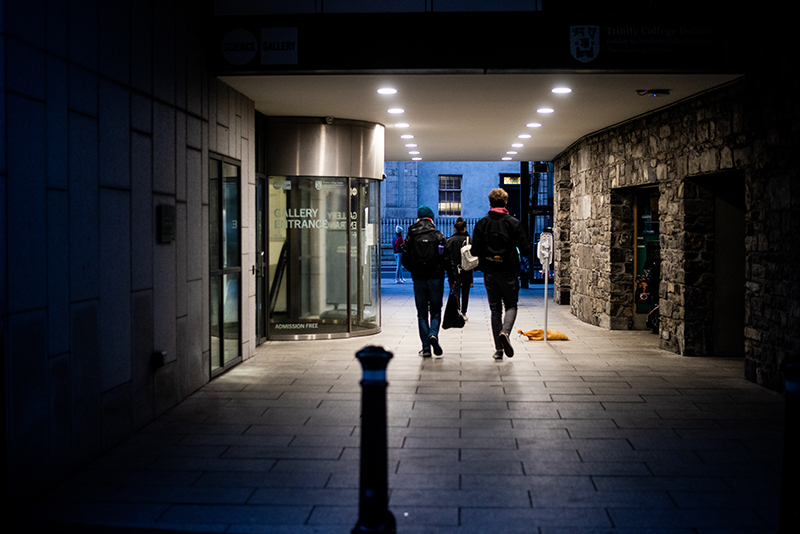I spent my Christmas break like most students: eating, drinking and defending the likelihood that I get a job with an arts degree to my family. A mostly comfortable existence after the flurry of first semester. Skipping right over exams (because who needs reminding), I came to what I call “application season”. For some reason the application deadline for every summer internship, programme and scholarship happens to be between mid-January and early February. Like the fool I am, I spend hours filling out these applications knowing that, even if I were to get an offer from one of these highly-competitive programmes, I wouldn’t be able to accept.
Last Summer, when hospitality reopened, I reluctantly took a job cleaning bedrooms in the local hotel and worked in a chippy on the side. No, flipping burgers and cleaning toilets aren’t passions of mine, would you believe? I did it because, at that point, things were looking relatively optimistic regarding the virus and returning to college. Despite my delight at the thought of screaming Dua Lipa’s Future Nostalgia in nightclubs and taking four hour “breaks” from the library, I had something looming over me. If I didn’t make €3,000 in about three months then it wouldn’t just be the pandemic stopping me from moving back to Dublin.
This summer I am determined to dip my toe into the “professional” world. What does that look like for a working-class person? It looks like getting notifications from the career service about “exciting” and “career-advancing” opportunities only to find, upon further inspection, that they don’t pay. Like, anything. And I’m left feeling rather deflated.
Like the fool I am, I spend hours filling out these applications knowing that, even if I were to get an offer from one of these highly-competitive programmes, I wouldn’t be able to accept
If these opportunities really do as much for personal development as they boast then they should not be limited to one group of people. It’s like a ring of middle-class twenty-something year olds are running a self-confidence cartel, and they don’t even know it. Let’s face it, if an employer has to choose between two students: one with a Freddie Mercury-like air of confidence and one that’s shaking like a leaf because they’ve never even been in an office before, who do you think will get the job?
This goes much deeper than some working-class student simply missing out on the chance to get coffees for the employees of a Big Four firm. Overtime, students who can’t spend their summers establishing connections and saturating their CVs will fall behind others who have that luxury, and it is working class students who need these opportunities or they could potentially be playing “catch-up” for the entirety of their professional lives.
What about those summer programmes that promise leadership and networking opportunities? They’re mostly unpaid too or, to my horror, charge participants for the privilege! How much are you willing to pay to improve your communication skills? Or how much to charm someone in your desired industry who might give you a job in five years? People who can afford these experiences are no more deserving of them than people who cannot.
More importantly, why do companies feel so comfortable with this moral failure? Are they unaware that they are actively perpetuating socio-economic divides? Do they believe that what they offer in experience is payment enough? I suppose it is naive of me to expect large corporations, some of whom profit off of poverty, to “be the change they want to see in the world”. The reality is that they don’t want change and, for as long as they can get away with it, they will underpay workers and increase profit margins. The secretly centrist devil’s advocate in my economics tutorial would probably argue: “Don’t hate the player, hate the game”. As long as “the game” is legal, disadvantaged students will become more and more disadvantaged as each summer passes.
Overtime, students who can’t spend their summers establishing connections and saturating their CVs will fall behind others who have that luxury
This is not to bash jobs in the hospitality and service industries. As I said, I’ve worked in those industries myself, and I learned a lot (not quite enough to justify the still inadequate minimum wage, but that’s another opinion piece). However, these jobs are hardly comparable to an internship in an industry you actually want to work for in the future.
Worryingly, many people enjoy hearing blue-collar tales of overcoming adversity and breaking barriers, and while these are important, I don’t want to watch “inspiring” documentaries and The Late Late Show interviews about struggles that shouldn’t exist. A working-class person getting a job that pays more than minimum wage shouldn’t be some incredible feat. It should just be normal.
I expect there will be some boomer who will read this article and take it upon themself to remind us spoiled kids about “back in their day”. But we’re not in your day. We’re in 2021. It’s time to acknowledge the role of unpaid summer opportunities in the huge disparity that exists between classes, and we all have a duty to actively fight against it.







